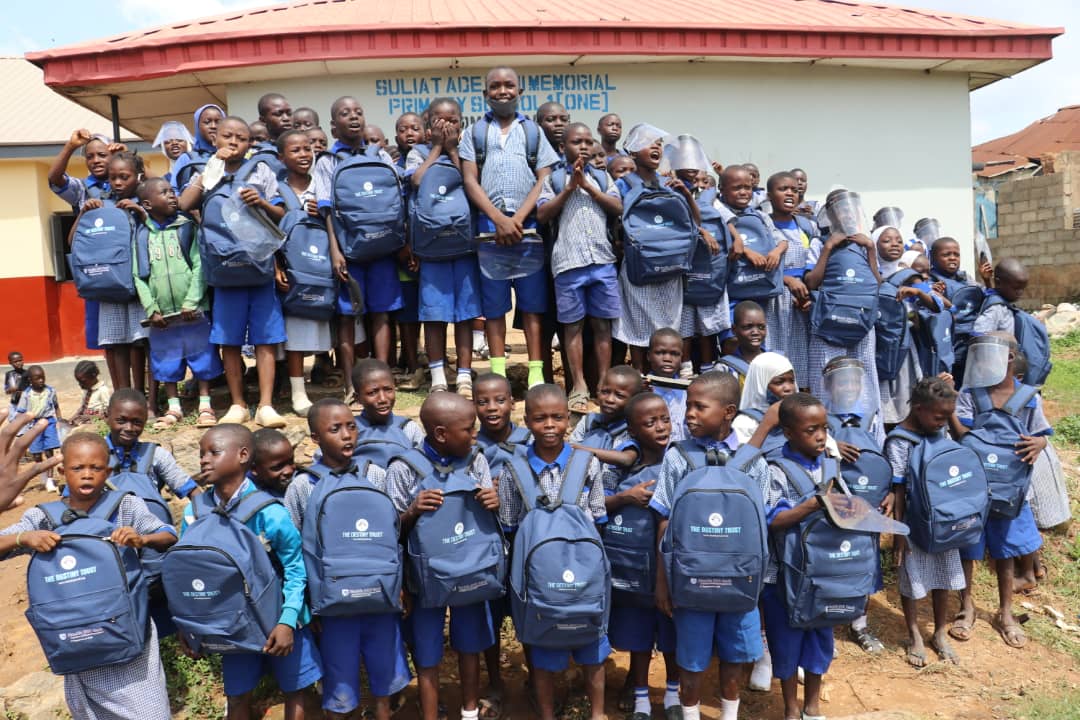Before 18-year-old Ademola Taiwo (not real name) met The Destiny Trust – a nonprofit dedicated to taking children off the streets and back to school – in 2012, he was a child without much hope for the future.
He used to live at the Kuramo Beach Front in Lagos – a ghetto or slum settlement where illicit activities held sway – with his mother and twin brother. He was nine at the time.
“We were always in the traffic running after cars to clean their windscreens so that we could have something to eat,” he said.
His mother could not provide shelter, so they slept in the open with a canopy as covering. She also could not afford to send them to school.
“We were introduced to lots of dangerous things that could have ruined our lives like stealing, drinking and smoking,” he said.
It is hard to get comprehensive data on the number of homeless children in Nigeria, but it is believed that millions of them live in the streets and other insecure areas. Some are among the 10.5 million 5-14-year-old out-of-school children across Nigeria, about 3.5% of the 303 million global total.
Gender discrimination, poverty, child labour, child marriage, under-funding of the education sector, and insecurity contribute to child homelessness and out-of-school situations here.
Taiwo finds a new life
On August 11, 2012, a team from The Destiny Trust had a food distribution outreach at Kuramo Beach Front. And that was the beginning of a better life for Taiwo.
“They had finished the outreach, and they were ready to leave when my brother and I heard about them,” Taiwo said. “They had exactly two packs of food with them, and that was what we ate that day.”
Later, the team sought permission from their single mother to take them to their (nonprofit’s) residential centre at Bogije, Ibeju-Lekki, Lagos, and she agreed. When all necessary documentation was concluded, the boys moved into the non-governmental organization’s home.
In the months following, the organization registered them at Fayay Comprehensive Academy, where they did part of their primary education, and later, at Flourish Hall International School for their secondary education. The nonprofit also taught them music, tailoring, shoemaking, and coding skills.
Destiny Trust, a product of a sad experience
One afternoon in 2010, while walking to a cybercafe at the University of Ibadan, where he was an undergraduate student at the time, Abimbola Ojenike saw a little girl fighting with her mother for not letting her go to school.
Her mother was blind, and the girl led her around to beg for alms. The girl had flung her mother’s walking stick in protest after seeing other children returning from school while she roamed the streets with her mother.
When a small crowd gathered, she told them how her mother kept promising her that she would go to school after raising some money, but she never kept her promise.
“It was sad seeing the situation around the girl and how difficult it would be to keep her in school without any guarantee for the welfare of her mother and herself,” Ojenike said.
Ojenike walked away from the scene with a resolve: to, later in life, establish a structure that supports poor and homeless children to go to school.
By 2012, Ojenike had finished his undergraduate studies and was working in a law firm. His resolve to help poor kids was still firm. Luckily, he discovered they shared the same passion when he shared the idea with two of his colleagues – Ikem Isiekwena and Kemi Olubob.
Together, with donations from family, friends and colleagues, they founded The Destiny Trust. They started by organizing “soup kitchen” outreaches at slums like Kuramo Beach Front. During the outreaches, the group distributed free food to homeless kids.
“We were shocked to see the number of children sleeping on the beachfront without parents or guardians,” Ojenike said.
Later, the team developed mirrored initiatives for taking kids off the streets and slums to school, including the Homeless Children Shelter and School Enrolment and Back-to-School initiatives.
Under Homeless Children Shelter, the organization rented three residential centres in Lagos and Oyo states to accommodate up to 100 kids per time. When it visits informal settlements like the Kuramo Beach Front, it seeks permission from parents of the most vulnerable children and brings them to the residential centres.
The nonprofit, which now has about 122 volunteers and takes care of the children’s basic needs at the centres, also works with the police and court orders to bring in homeless children without parents or guardians and abused kids in need of emergency shelter.
‘The [residential centre] in Lagos is a two-wing duplex that is now even supported by another 12-room apartment just next to it, and that is big enough for the number of children we target for that location. The same thing we have in Abadan [Oyo},” Ojenike said.
Under its School Enrolment and Back-to-School Initiative, the group partners with other groups (religious houses mostly) to send those who need educational support the most to private primary and secondary schools and later to the university.
He said one way of decongesting the residential areas and making room for new kids is by sending some kids to boarding schools where they also live.
“Covenant Nation (a church), for example, [has] 16 children under their program. They pay basic tuition from year to year, and that is a major relief for us,” Ojenike said. He said four different church denominations have dozens of children under their educational care.
Through this initiative, The Destiny Trust has supported close to 3,000 children to school since 2012.
But contributions from partnering groups amount to just about 10% of The Destiny Trust’s total yearly expenses, according to Ojenike. He said the rest of the charity’s funding comes from crowdfunding and support from family, friends and colleagues.
“Once a year, there is a campaign we call 1000 helping hands [on social media] where we look for 1000 people to commit to making consistent monthly donations to us,” he said. “Most times, we are not able to hit 1000; we achieve around 300 or 250. But we have a wide network of people who know about our work and who recommend our work to other people [to donate].”
Regarding how long a child can stay at its centre, Ojenike said it “depends on why they came in, but no child lives with us perpetually.” Those brought in for emergency shelter stay “temporarily till the circumstances change.” And even those under continuing care cannot stay beyond their 18th birthday.
Fortunately, most are ready to leave for their university education before turning 18. If they turn 18 before they are prepared for university, they are sent to boarding schools.
The end goal of the whole intervention is a multiplier effect with benefits trickling down to whole families and communities, Ojenike said.
“We raise the child to go and raise the family and the community. The idea is that if you cannot feed the entire family at once, take one person, fix that person, send that person back to that family to go and face that problem and empower your family to be able to stand. That’s how we can break the cycle of trans-generational poverty,” he said.
Guesswork
In major cities like Lagos, comprehensive data on the number of homeless children and the population of slum settlers is hard to find. Ojenike said this makes it difficult to measure the dimension of the problem at the intersection of education and homelessness. It also slows his team’s work because they have to operate by guesswork.
But the nonprofit is now documenting and gathering this data. It hopes to share it with policymakers for policy development because “we cannot fix Nigeria’s educational problems with philanthropy alone, Ojenike said. “The scale is bigger, and the dimensions are much more diverse than what charity can grapple with.”
Meanwhile, Taiwo is now an undergraduate student at the University of Ibadan studying wood products engineering under The Destiny Trust’s sponsorship.
“If not for The Destiny Trust that God used to transform my story, I would have been an “area boy [a violent street tout],” he said. “So many of my childhood friends had died on the streets.”
Before meeting The Destiny Trust, a nonprofit dedicated to assisting homeless children, 18-year-old Ademola Taiwo lived in dire conditions at Kuramo Beach Front in Lagos with his mother and brother. Lacking shelter and education, the children were exposed to dangerous activities. The Destiny Trust’s outreach in 2012 provided Taiwo and his brother with food and later, a permanent home and education. The nonprofit sent them to schools and taught practical skills like music and coding.
The Destiny Trust was founded by Abimbola Ojenike, inspired by a heartbreaking encounter in 2010 involving a girl unable to attend school due to poverty. Together with his colleagues, the Trust began with food distribution to children in slums and evolved to establishing initiatives like Homeless Children Shelter and School Enrolment programs. They run residential centers in Lagos and Oyo states and partner with other organizations to support education for underprivileged children.
Since 2012, The Destiny Trust has supported nearly 3,000 children with education and basic needs, funded largely through donations and crowdfunding. The organization provides temporary and long-term care but ensures children do not stay beyond 18 years old, encouraging them to pursue higher education or boarding schools. Taiwo, now an undergraduate at the University of Ibadan, credits the organization for transforming his life, emphasizing the Trust's mission to break the cycle of generational poverty. The nonprofit aims to gather data on homeless children to inform policymakers and amplify their impact.






